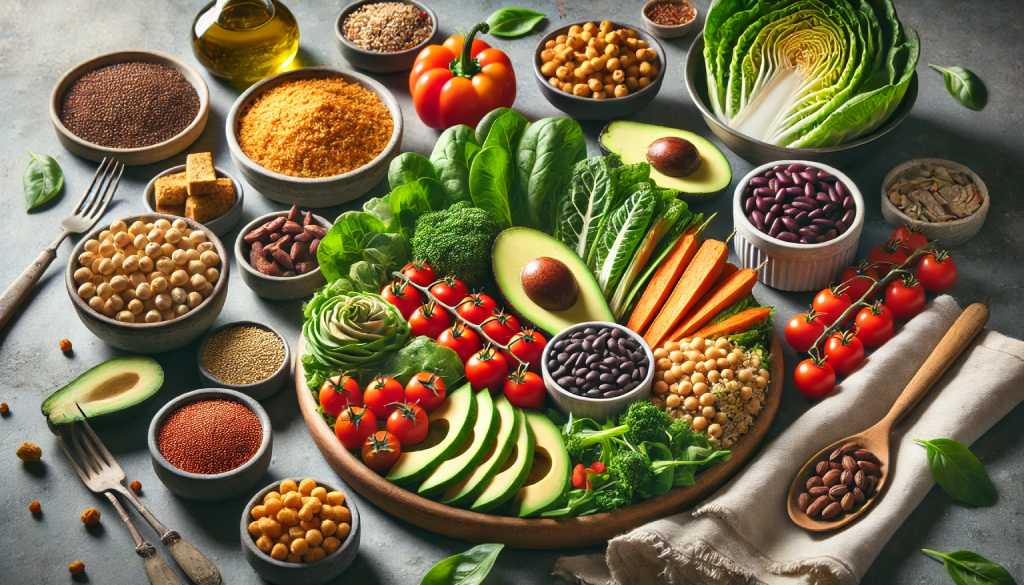
Our product evaluations are completely independent and free from advertisements. Should you make a purchase via the links on our website, we might receive a small commission, which is a key support for our review process. For more details, click here.
The Vegan Diet is more than just a trend—it’s a shift towards health, ethics, and sustainability. After exploring multiple diets, I’ve come to appreciate the holistic benefits of veganism. This guide provides an in-depth look into what the Vegan Diet entails, the health benefits, potential challenges, and a practical meal plan to get you started. Let’s dive in!
Overview and Personal Thoughts on the Vegan Diet
The Vegan Diet has an appeal that goes beyond weight loss. Many are drawn to veganism for ethical reasons, environmental impact, or for health benefits like reduced inflammation and improved digestion. Personally, I appreciate the balance it brings. This isn’t about restriction or calorie-counting; it’s about choosing foods that nourish the body and mind. While some diets can feel too restrictive, veganism offers a sense of freedom and creativity in the kitchen.
I’ve tried different versions of veganism, from high-protein and low-carb to raw and plant-based variations. Each approach has unique benefits, and a vegan diet can adapt to different dietary needs or health goals. Whether you’re drawn to it for ethical reasons or health goals, the Vegan Diet has options for everyone.
Core Principles of the Vegan Diet
The Vegan Diet is straightforward: it’s a plant-based diet, excluding all animal-derived products. That means no meat, dairy, eggs, or even honey. Instead, it emphasizes a variety of vegetables, fruits, whole grains, legumes, nuts, and seeds. As you navigate veganism, the key principles to keep in mind are:
- Nutrient-Dense, Plant-Based Foods: A variety of fresh, whole foods form the foundation of the Vegan Diet.
- High Fiber: Plant foods are naturally high in fiber, which supports digestion, blood sugar balance, and satiety.
- Minimal Processed Foods: While some vegan diets include processed substitutes, focusing on whole, minimally processed foods ensures optimal health.
- Healthy Fats: From avocados to olive oil, healthy fats are crucial for nutrient absorption and satiety.
- Mindful Protein Choices: With careful planning, vegans can meet their protein needs through legumes, tofu, and seeds.
Vegan Diet Food Pyramid
A vegan food pyramid provides a visual guide to balanced eating, emphasizing daily and weekly consumption:
- Daily Foods: Vegetables, fruits, whole grains, legumes, nuts, seeds
- Foods in Moderation: Plant-based snacks, vegan cheeses, and processed vegan products
- Treats: Vegan desserts, added sugars, and vegan junk food in moderation
This pyramid offers flexibility, allowing you to personalize your diet based on health goals, whether it’s weight loss, muscle gain, or simply improved energy.
Pros and Cons of the Vegan Diet
Pros:

- Heart Health: Studies link vegan diets to lower cholesterol and blood pressure.
- Weight Management: Due to the high fiber content and lower caloric density, many people find it easier to maintain a healthy weight.
- Reduced Risk of Chronic Diseases: Research shows that vegan diets can reduce the risk of diabetes, cancer, and cardiovascular diseases.
- Environmental Impact: Plant-based diets significantly reduce water and land use compared to meat-based diets.
- Mental Clarity and Energy: Many report feeling more energized on a vegan diet, which may be due to nutrient-dense foods and reduced intake of heavy animal products.
Cons:
- Nutrient Deficiencies: Without proper planning, deficiencies in B12, iron, calcium, and omega-3s are possible.
- Digestive Adjustments: Some experience bloating or gas when first transitioning to high-fiber plant foods.
- Limited Options When Eating Out: Depending on where you live, vegan-friendly options may be limited in restaurants.
- Social Challenges: Veganism can sometimes feel isolating in social situations, especially where plant-based options aren’t available.
- Budget Considerations: Specialty vegan foods can be pricey, although basic staples like beans and grains are usually affordable.
My Vegan Shopping List Essentials
Shopping for vegan foods is simple, though it may require you to explore new ingredients and products. Here’s a comprehensive list to get you started:
- Vegetables: Leafy greens (spinach, kale), cruciferous vegetables (broccoli, cauliflower), root veggies (sweet potatoes, carrots), peppers, tomatoes
- Fruits: Berries, apples, oranges, bananas, grapes, mangoes, avocados
- Whole Grains: Brown rice, quinoa, oats, whole wheat bread, barley, bulgur
- Protein Sources: Tofu, tempeh, seitan, lentils, chickpeas, black beans
- Nuts and Seeds: Almonds, walnuts, chia seeds, flaxseeds, sunflower seeds
- Healthy Fats: Extra virgin olive oil, avocado oil, coconut oil (in moderation)
- Herbs and Spices: Turmeric, cumin, garlic, basil, oregano, nutritional yeast
- Dairy Alternatives: Almond milk, soy milk, oat milk, coconut yogurt
- Pantry Staples: Canned tomatoes, coconut milk, vegetable broth, tahini, soy sauce
Shopping with a list makes it easy to plan meals and avoid highly processed vegan products. Basics like grains and legumes are budget-friendly and versatile, making vegan meal prep simple and affordable.
What to Avoid on the Vegan Diet
To ensure a well-rounded and healthy diet, steer clear of:

- Animal Products: Meat, dairy, eggs, honey (common question: do vegans eat eggs?—the answer is no).
- Highly Processed Foods: Some vegan products are heavily processed and lack nutritional value.
- Refined Grains: Choose whole grains over refined options.
- Sugary Beverages and Alcohol: High in empty calories; opt for water, tea, or occasional red wine if desired.
- Palm Oil: Although technically vegan, some avoid it due to environmental concerns.
Benefits of the Vegan Diet
Going vegan has brought me several benefits beyond just physical health. Here are some of the primary reasons I stick with it:
- Heart Health: Low in saturated fats and high in fiber, the Vegan Diet is beneficial for cardiovascular health.
- Improved Digestion: The high fiber content supports regularity and digestive health.
- Weight Management: With the lower caloric density of plant foods, many find weight management easier.
- Energy and Mental Clarity: Veganism often leads to reduced fatigue and clearer thinking, possibly due to reduced intake of processed foods and saturated fats.
- Better Skin Health: Many find that veganism improves skin, likely due to reduced dairy intake and increased antioxidant-rich foods.
- Lower Cancer Risk: A diet rich in fruits and vegetables provides antioxidants that may reduce cancer risk.
Sample Vegan Meal Plan
Creating a balanced vegan meal plan is simple with a few go-to recipes.
Vegan Diet Breakfast Recipes
- Overnight Oats: Rolled oats soaked in almond milk, topped with chia seeds, berries, and a drizzle of maple syrup.
- Smoothie Bowl: Blended banana, spinach, and almond milk, topped with chia seeds, granola, and nuts.
- Avocado Toast: Whole grain toast with mashed avocado, cherry tomatoes, and a sprinkle of seeds.
- Chickpea Omelet: Made with chickpea flour, turmeric, and your favorite veggies.
Vegan Diet Dinner Recipes

- Stuffed Sweet Potatoes: Baked sweet potatoes filled with black beans, avocado, and salsa.
- Vegan Buddha Bowl: Brown rice, chickpeas, sautéed greens, avocado, and a tahini drizzle.
- Lentil Bolognese: Lentils in marinara sauce over whole grain pasta.
- Vegan Tacos: Corn tortillas with spicy black beans, avocado, and salsa.
Frequently Asked Questions
Final Thoughts: Why I Recommend the Vegan Diet
The Vegan Diet has transformed my approach to food and health. It’s more than a diet; it’s a lifestyle that aligns with values of compassion, sustainability, and wellness. If you’re curious about trying veganism, remember it doesn’t have to be an all-or-nothing commitment at first. Small steps—like replacing a few meals a week with plant-based options—can help you explore veganism in a way that feels achievable.
From my experience, once you dive into veganism, you begin discovering new foods, flavors, and even communities of people who share similar goals. It’s a rewarding experience that can improve your health, expand your culinary skills, and contribute to a more sustainable world.
Incorporating veganism doesn’t mean compromising on delicious food. In fact, I’ve found that cooking with plants allows for more creativity, variety, and vibrant flavors. With the right planning, a vegan diet provides all the nutrients your body needs. Whether you’re focused on weight loss, improving health, or supporting the environment, a vegan lifestyle can be adapted to meet your goals.